Ethical Leadership: Case Study - An Offer You Can’t Refuse?
VerifiedAdded on 2022/12/19
|18
|5256
|2
Report
AI Summary
This report analyzes the case study "An Offer You Can't Refuse?" focusing on ethical leadership and decision-making. It examines the dilemma faced by Sheila, who is offered confidential information from a competitor's employee. The report explores the application of ethical theories like Kantianism and utilitarianism, stakeholder theory, and the triple bottom line approach. The author argues that Sheila should reject the offer, emphasizing the importance of business ethics, stakeholder benefits, and long-term sustainability. The report highlights the pressures of ethical decision-making and recommends actions aligned with ethical principles, promoting a course of action that prioritizes ethical conduct and long-term organizational success.
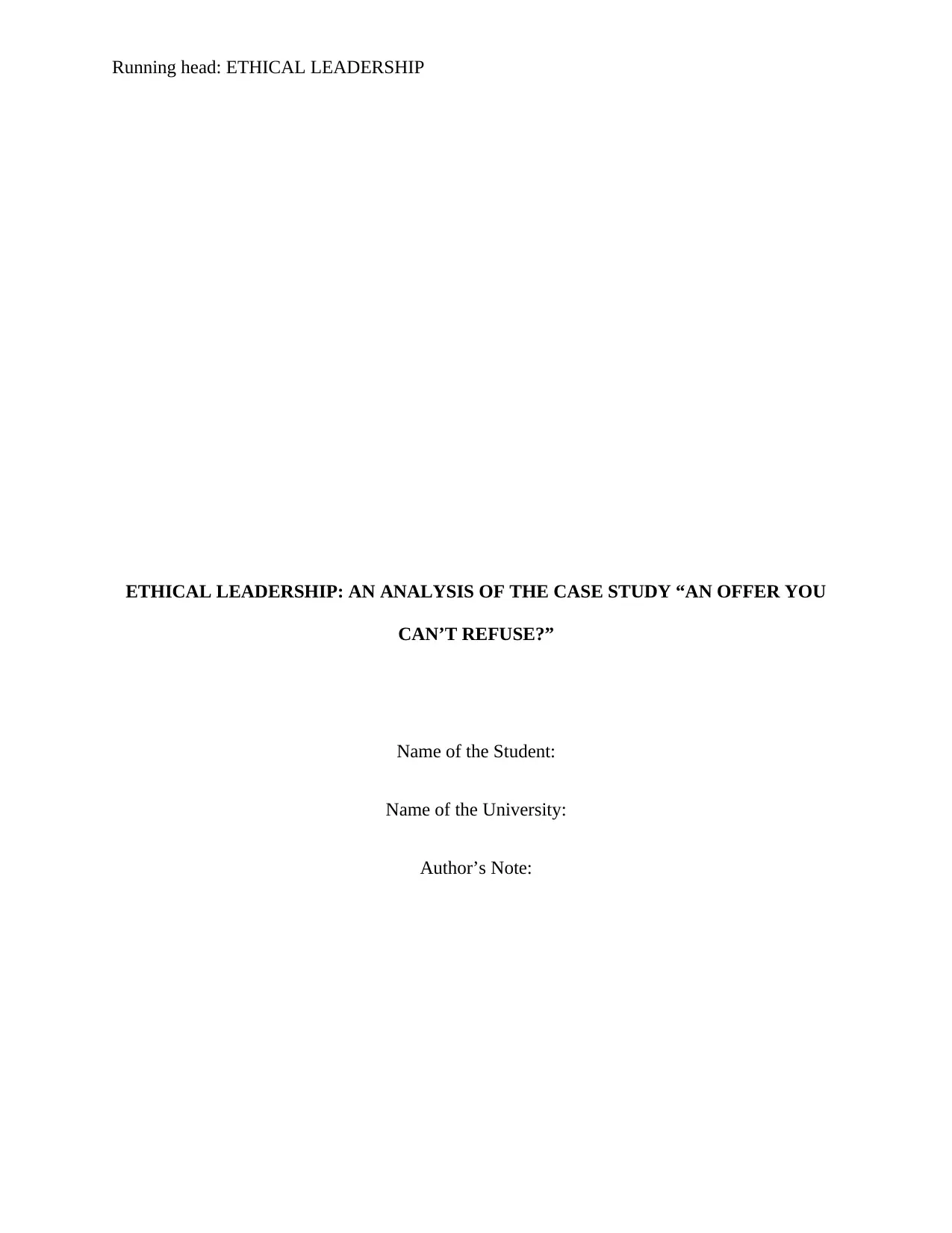
Running head: ETHICAL LEADERSHIP
ETHICAL LEADERSHIP: AN ANALYSIS OF THE CASE STUDY “AN OFFER YOU
CAN’T REFUSE?”
Name of the Student:
Name of the University:
Author’s Note:
ETHICAL LEADERSHIP: AN ANALYSIS OF THE CASE STUDY “AN OFFER YOU
CAN’T REFUSE?”
Name of the Student:
Name of the University:
Author’s Note:
Paraphrase This Document
Need a fresh take? Get an instant paraphrase of this document with our AI Paraphraser
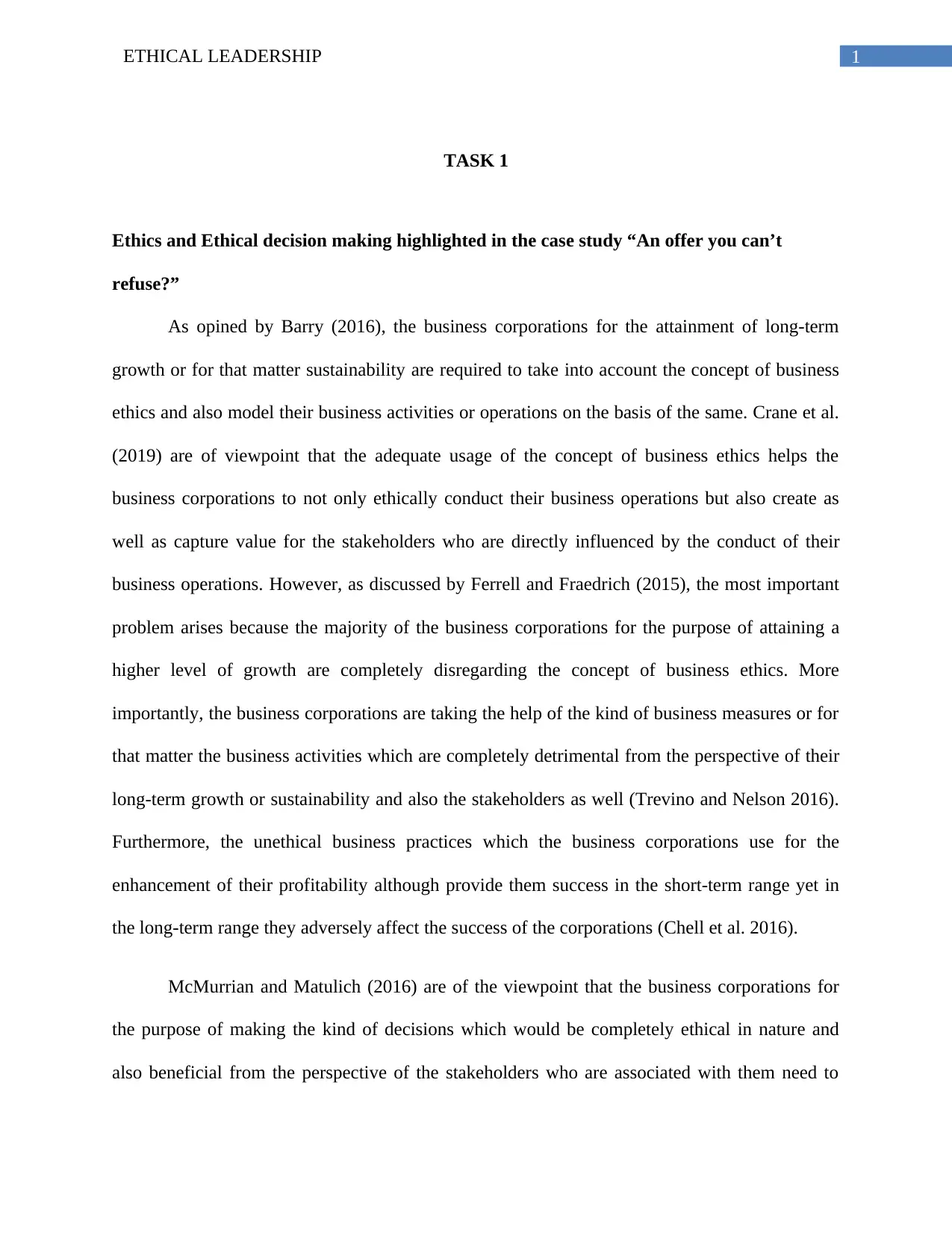
1ETHICAL LEADERSHIP
TASK 1
Ethics and Ethical decision making highlighted in the case study “An offer you can’t
refuse?”
As opined by Barry (2016), the business corporations for the attainment of long-term
growth or for that matter sustainability are required to take into account the concept of business
ethics and also model their business activities or operations on the basis of the same. Crane et al.
(2019) are of viewpoint that the adequate usage of the concept of business ethics helps the
business corporations to not only ethically conduct their business operations but also create as
well as capture value for the stakeholders who are directly influenced by the conduct of their
business operations. However, as discussed by Ferrell and Fraedrich (2015), the most important
problem arises because the majority of the business corporations for the purpose of attaining a
higher level of growth are completely disregarding the concept of business ethics. More
importantly, the business corporations are taking the help of the kind of business measures or for
that matter the business activities which are completely detrimental from the perspective of their
long-term growth or sustainability and also the stakeholders as well (Trevino and Nelson 2016).
Furthermore, the unethical business practices which the business corporations use for the
enhancement of their profitability although provide them success in the short-term range yet in
the long-term range they adversely affect the success of the corporations (Chell et al. 2016).
McMurrian and Matulich (2016) are of the viewpoint that the business corporations for
the purpose of making the kind of decisions which would be completely ethical in nature and
also beneficial from the perspective of the stakeholders who are associated with them need to
TASK 1
Ethics and Ethical decision making highlighted in the case study “An offer you can’t
refuse?”
As opined by Barry (2016), the business corporations for the attainment of long-term
growth or for that matter sustainability are required to take into account the concept of business
ethics and also model their business activities or operations on the basis of the same. Crane et al.
(2019) are of viewpoint that the adequate usage of the concept of business ethics helps the
business corporations to not only ethically conduct their business operations but also create as
well as capture value for the stakeholders who are directly influenced by the conduct of their
business operations. However, as discussed by Ferrell and Fraedrich (2015), the most important
problem arises because the majority of the business corporations for the purpose of attaining a
higher level of growth are completely disregarding the concept of business ethics. More
importantly, the business corporations are taking the help of the kind of business measures or for
that matter the business activities which are completely detrimental from the perspective of their
long-term growth or sustainability and also the stakeholders as well (Trevino and Nelson 2016).
Furthermore, the unethical business practices which the business corporations use for the
enhancement of their profitability although provide them success in the short-term range yet in
the long-term range they adversely affect the success of the corporations (Chell et al. 2016).
McMurrian and Matulich (2016) are of the viewpoint that the business corporations for
the purpose of making the kind of decisions which would be completely ethical in nature and
also beneficial from the perspective of the stakeholders who are associated with them need to
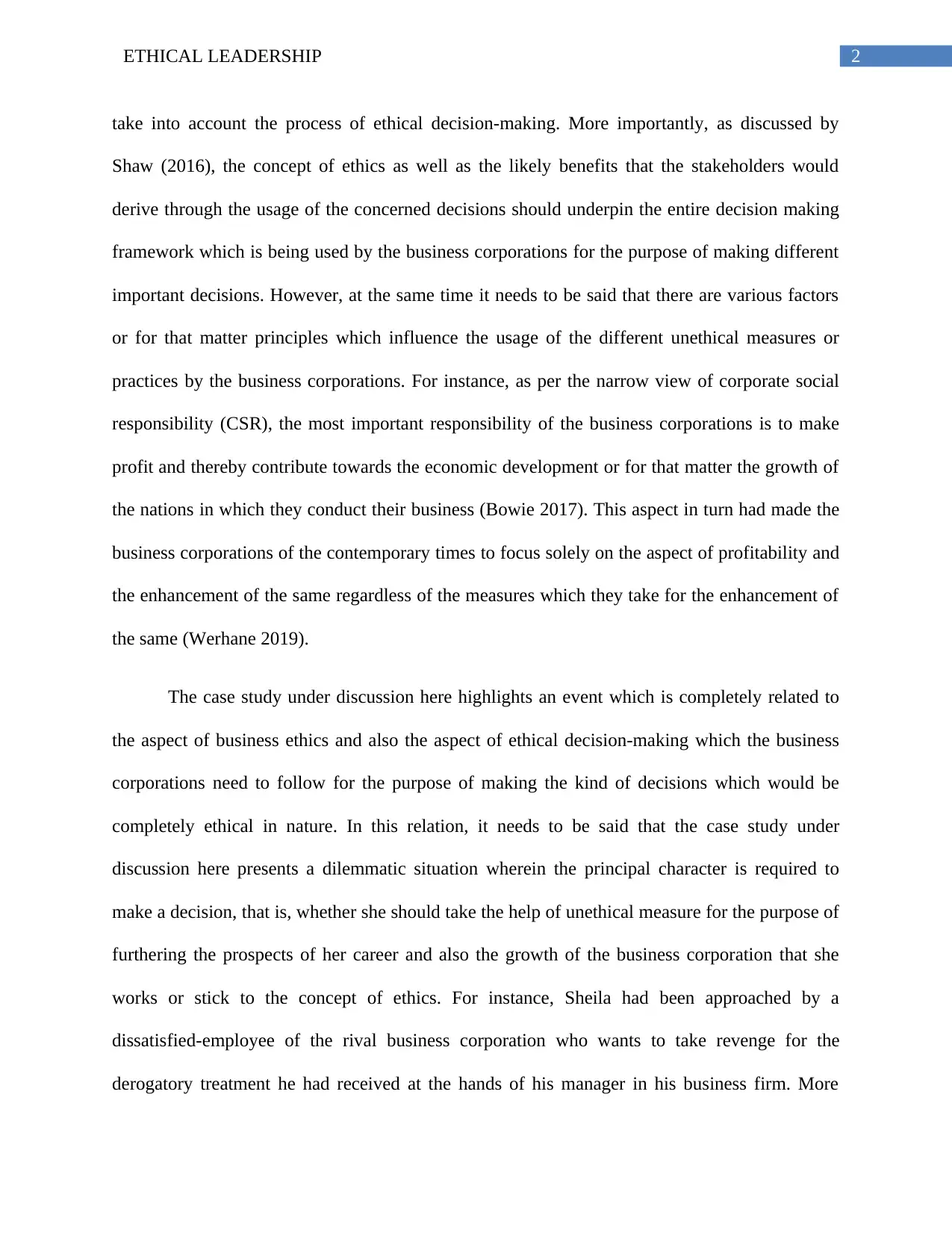
2ETHICAL LEADERSHIP
take into account the process of ethical decision-making. More importantly, as discussed by
Shaw (2016), the concept of ethics as well as the likely benefits that the stakeholders would
derive through the usage of the concerned decisions should underpin the entire decision making
framework which is being used by the business corporations for the purpose of making different
important decisions. However, at the same time it needs to be said that there are various factors
or for that matter principles which influence the usage of the different unethical measures or
practices by the business corporations. For instance, as per the narrow view of corporate social
responsibility (CSR), the most important responsibility of the business corporations is to make
profit and thereby contribute towards the economic development or for that matter the growth of
the nations in which they conduct their business (Bowie 2017). This aspect in turn had made the
business corporations of the contemporary times to focus solely on the aspect of profitability and
the enhancement of the same regardless of the measures which they take for the enhancement of
the same (Werhane 2019).
The case study under discussion here highlights an event which is completely related to
the aspect of business ethics and also the aspect of ethical decision-making which the business
corporations need to follow for the purpose of making the kind of decisions which would be
completely ethical in nature. In this relation, it needs to be said that the case study under
discussion here presents a dilemmatic situation wherein the principal character is required to
make a decision, that is, whether she should take the help of unethical measure for the purpose of
furthering the prospects of her career and also the growth of the business corporation that she
works or stick to the concept of ethics. For instance, Sheila had been approached by a
dissatisfied-employee of the rival business corporation who wants to take revenge for the
derogatory treatment he had received at the hands of his manager in his business firm. More
take into account the process of ethical decision-making. More importantly, as discussed by
Shaw (2016), the concept of ethics as well as the likely benefits that the stakeholders would
derive through the usage of the concerned decisions should underpin the entire decision making
framework which is being used by the business corporations for the purpose of making different
important decisions. However, at the same time it needs to be said that there are various factors
or for that matter principles which influence the usage of the different unethical measures or
practices by the business corporations. For instance, as per the narrow view of corporate social
responsibility (CSR), the most important responsibility of the business corporations is to make
profit and thereby contribute towards the economic development or for that matter the growth of
the nations in which they conduct their business (Bowie 2017). This aspect in turn had made the
business corporations of the contemporary times to focus solely on the aspect of profitability and
the enhancement of the same regardless of the measures which they take for the enhancement of
the same (Werhane 2019).
The case study under discussion here highlights an event which is completely related to
the aspect of business ethics and also the aspect of ethical decision-making which the business
corporations need to follow for the purpose of making the kind of decisions which would be
completely ethical in nature. In this relation, it needs to be said that the case study under
discussion here presents a dilemmatic situation wherein the principal character is required to
make a decision, that is, whether she should take the help of unethical measure for the purpose of
furthering the prospects of her career and also the growth of the business corporation that she
works or stick to the concept of ethics. For instance, Sheila had been approached by a
dissatisfied-employee of the rival business corporation who wants to take revenge for the
derogatory treatment he had received at the hands of his manager in his business firm. More
⊘ This is a preview!⊘
Do you want full access?
Subscribe today to unlock all pages.

Trusted by 1+ million students worldwide
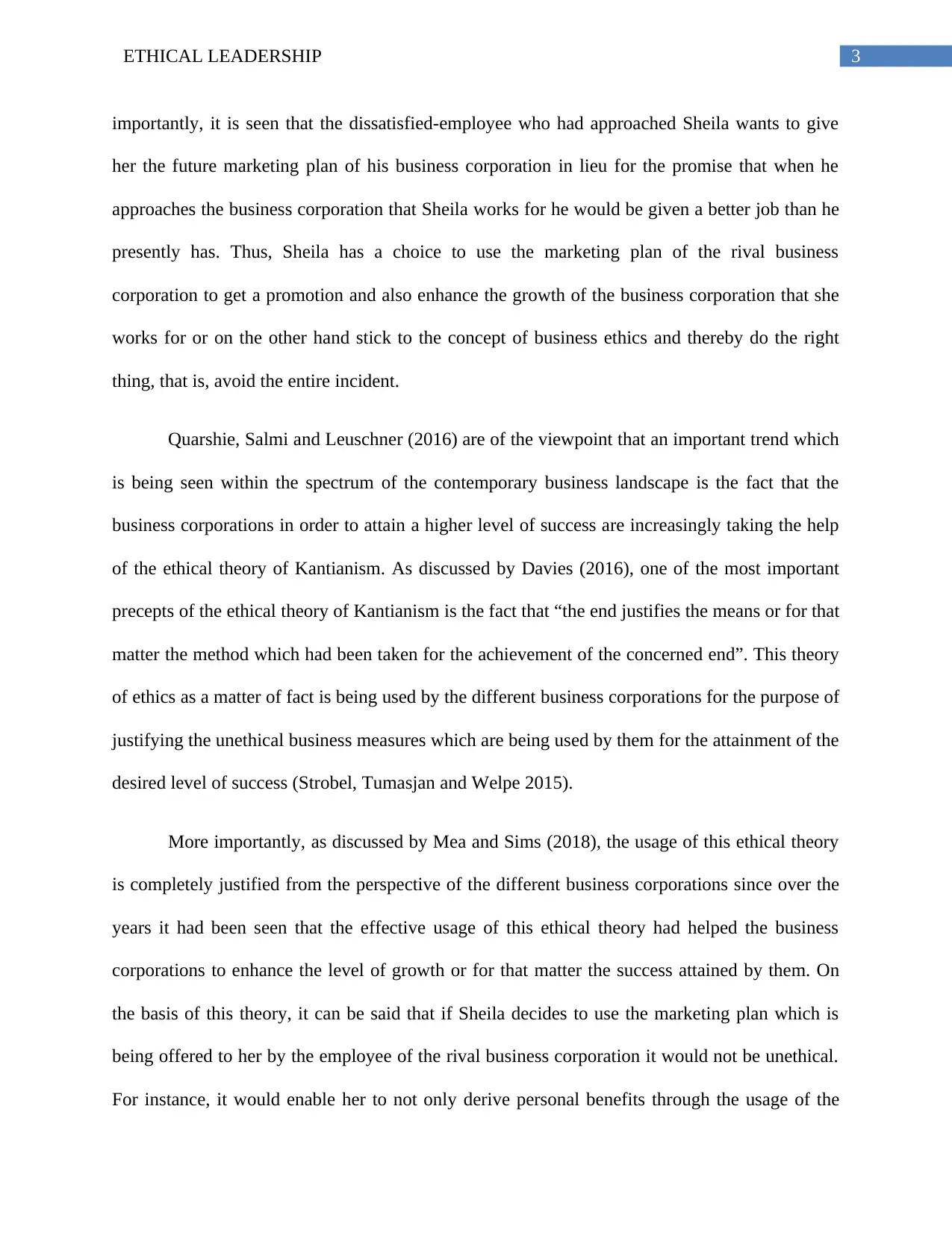
3ETHICAL LEADERSHIP
importantly, it is seen that the dissatisfied-employee who had approached Sheila wants to give
her the future marketing plan of his business corporation in lieu for the promise that when he
approaches the business corporation that Sheila works for he would be given a better job than he
presently has. Thus, Sheila has a choice to use the marketing plan of the rival business
corporation to get a promotion and also enhance the growth of the business corporation that she
works for or on the other hand stick to the concept of business ethics and thereby do the right
thing, that is, avoid the entire incident.
Quarshie, Salmi and Leuschner (2016) are of the viewpoint that an important trend which
is being seen within the spectrum of the contemporary business landscape is the fact that the
business corporations in order to attain a higher level of success are increasingly taking the help
of the ethical theory of Kantianism. As discussed by Davies (2016), one of the most important
precepts of the ethical theory of Kantianism is the fact that “the end justifies the means or for that
matter the method which had been taken for the achievement of the concerned end”. This theory
of ethics as a matter of fact is being used by the different business corporations for the purpose of
justifying the unethical business measures which are being used by them for the attainment of the
desired level of success (Strobel, Tumasjan and Welpe 2015).
More importantly, as discussed by Mea and Sims (2018), the usage of this ethical theory
is completely justified from the perspective of the different business corporations since over the
years it had been seen that the effective usage of this ethical theory had helped the business
corporations to enhance the level of growth or for that matter the success attained by them. On
the basis of this theory, it can be said that if Sheila decides to use the marketing plan which is
being offered to her by the employee of the rival business corporation it would not be unethical.
For instance, it would enable her to not only derive personal benefits through the usage of the
importantly, it is seen that the dissatisfied-employee who had approached Sheila wants to give
her the future marketing plan of his business corporation in lieu for the promise that when he
approaches the business corporation that Sheila works for he would be given a better job than he
presently has. Thus, Sheila has a choice to use the marketing plan of the rival business
corporation to get a promotion and also enhance the growth of the business corporation that she
works for or on the other hand stick to the concept of business ethics and thereby do the right
thing, that is, avoid the entire incident.
Quarshie, Salmi and Leuschner (2016) are of the viewpoint that an important trend which
is being seen within the spectrum of the contemporary business landscape is the fact that the
business corporations in order to attain a higher level of success are increasingly taking the help
of the ethical theory of Kantianism. As discussed by Davies (2016), one of the most important
precepts of the ethical theory of Kantianism is the fact that “the end justifies the means or for that
matter the method which had been taken for the achievement of the concerned end”. This theory
of ethics as a matter of fact is being used by the different business corporations for the purpose of
justifying the unethical business measures which are being used by them for the attainment of the
desired level of success (Strobel, Tumasjan and Welpe 2015).
More importantly, as discussed by Mea and Sims (2018), the usage of this ethical theory
is completely justified from the perspective of the different business corporations since over the
years it had been seen that the effective usage of this ethical theory had helped the business
corporations to enhance the level of growth or for that matter the success attained by them. On
the basis of this theory, it can be said that if Sheila decides to use the marketing plan which is
being offered to her by the employee of the rival business corporation it would not be unethical.
For instance, it would enable her to not only derive personal benefits through the usage of the
Paraphrase This Document
Need a fresh take? Get an instant paraphrase of this document with our AI Paraphraser
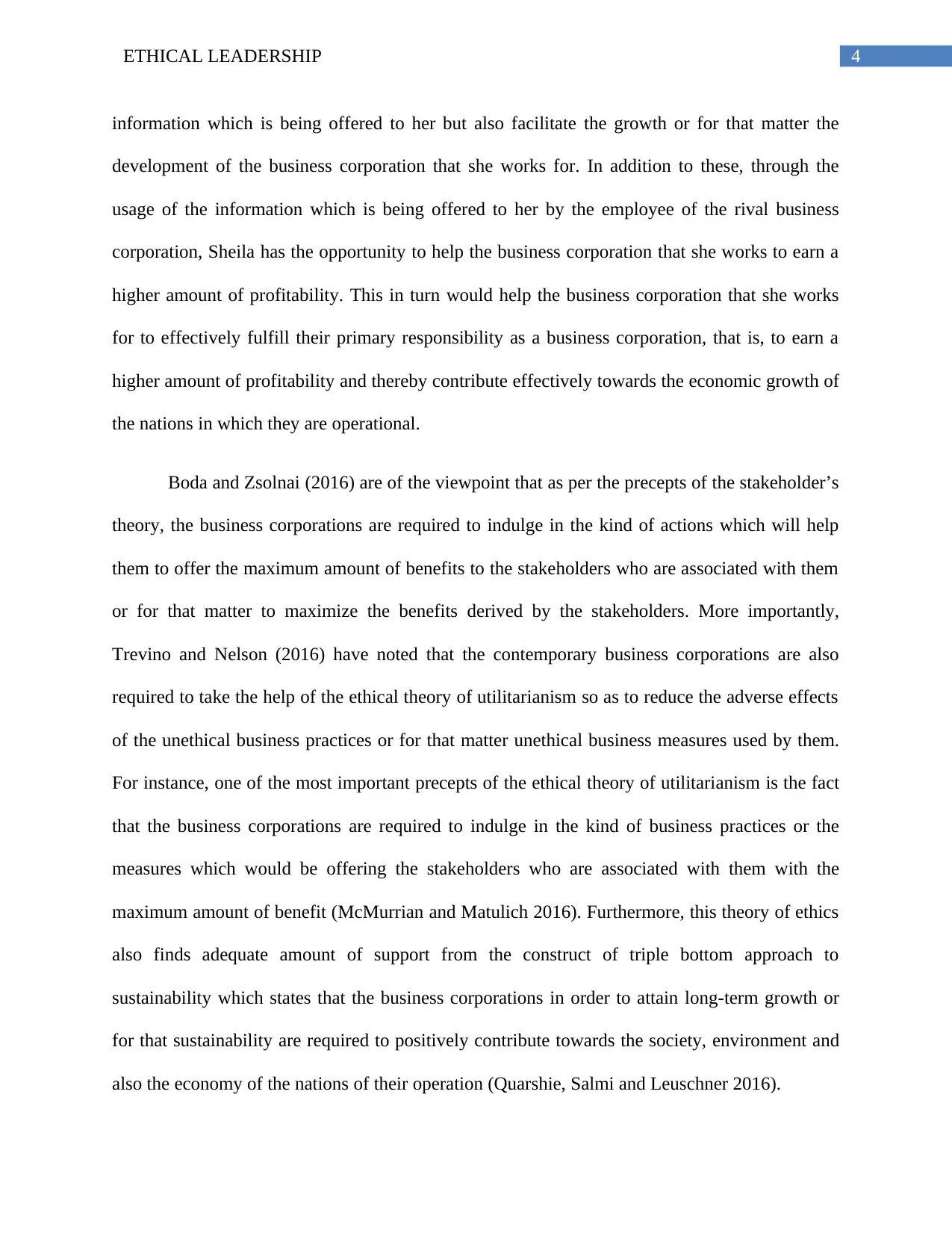
4ETHICAL LEADERSHIP
information which is being offered to her but also facilitate the growth or for that matter the
development of the business corporation that she works for. In addition to these, through the
usage of the information which is being offered to her by the employee of the rival business
corporation, Sheila has the opportunity to help the business corporation that she works to earn a
higher amount of profitability. This in turn would help the business corporation that she works
for to effectively fulfill their primary responsibility as a business corporation, that is, to earn a
higher amount of profitability and thereby contribute effectively towards the economic growth of
the nations in which they are operational.
Boda and Zsolnai (2016) are of the viewpoint that as per the precepts of the stakeholder’s
theory, the business corporations are required to indulge in the kind of actions which will help
them to offer the maximum amount of benefits to the stakeholders who are associated with them
or for that matter to maximize the benefits derived by the stakeholders. More importantly,
Trevino and Nelson (2016) have noted that the contemporary business corporations are also
required to take the help of the ethical theory of utilitarianism so as to reduce the adverse effects
of the unethical business practices or for that matter unethical business measures used by them.
For instance, one of the most important precepts of the ethical theory of utilitarianism is the fact
that the business corporations are required to indulge in the kind of business practices or the
measures which would be offering the stakeholders who are associated with them with the
maximum amount of benefit (McMurrian and Matulich 2016). Furthermore, this theory of ethics
also finds adequate amount of support from the construct of triple bottom approach to
sustainability which states that the business corporations in order to attain long-term growth or
for that sustainability are required to positively contribute towards the society, environment and
also the economy of the nations of their operation (Quarshie, Salmi and Leuschner 2016).
information which is being offered to her but also facilitate the growth or for that matter the
development of the business corporation that she works for. In addition to these, through the
usage of the information which is being offered to her by the employee of the rival business
corporation, Sheila has the opportunity to help the business corporation that she works to earn a
higher amount of profitability. This in turn would help the business corporation that she works
for to effectively fulfill their primary responsibility as a business corporation, that is, to earn a
higher amount of profitability and thereby contribute effectively towards the economic growth of
the nations in which they are operational.
Boda and Zsolnai (2016) are of the viewpoint that as per the precepts of the stakeholder’s
theory, the business corporations are required to indulge in the kind of actions which will help
them to offer the maximum amount of benefits to the stakeholders who are associated with them
or for that matter to maximize the benefits derived by the stakeholders. More importantly,
Trevino and Nelson (2016) have noted that the contemporary business corporations are also
required to take the help of the ethical theory of utilitarianism so as to reduce the adverse effects
of the unethical business practices or for that matter unethical business measures used by them.
For instance, one of the most important precepts of the ethical theory of utilitarianism is the fact
that the business corporations are required to indulge in the kind of business practices or the
measures which would be offering the stakeholders who are associated with them with the
maximum amount of benefit (McMurrian and Matulich 2016). Furthermore, this theory of ethics
also finds adequate amount of support from the construct of triple bottom approach to
sustainability which states that the business corporations in order to attain long-term growth or
for that sustainability are required to positively contribute towards the society, environment and
also the economy of the nations of their operation (Quarshie, Salmi and Leuschner 2016).
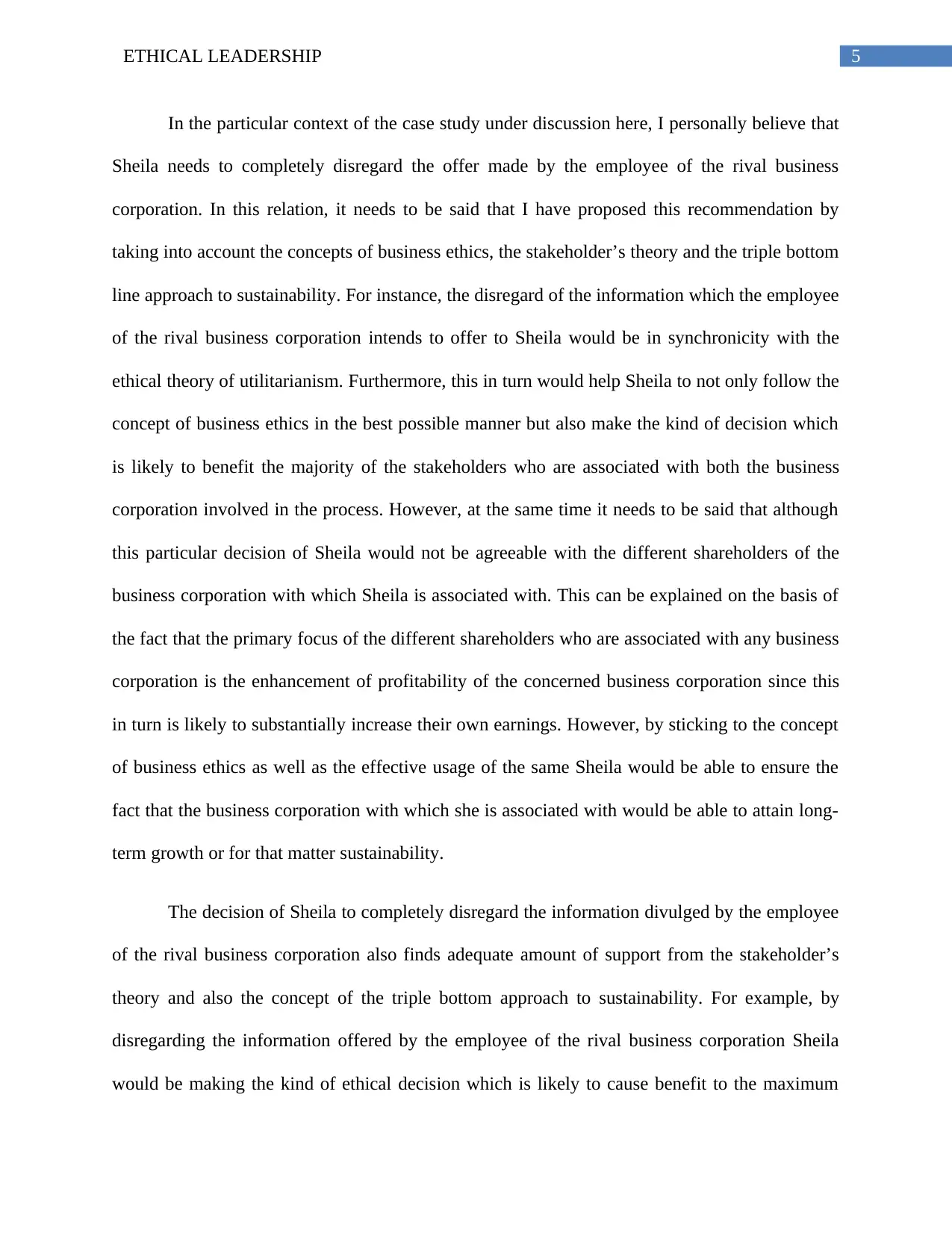
5ETHICAL LEADERSHIP
In the particular context of the case study under discussion here, I personally believe that
Sheila needs to completely disregard the offer made by the employee of the rival business
corporation. In this relation, it needs to be said that I have proposed this recommendation by
taking into account the concepts of business ethics, the stakeholder’s theory and the triple bottom
line approach to sustainability. For instance, the disregard of the information which the employee
of the rival business corporation intends to offer to Sheila would be in synchronicity with the
ethical theory of utilitarianism. Furthermore, this in turn would help Sheila to not only follow the
concept of business ethics in the best possible manner but also make the kind of decision which
is likely to benefit the majority of the stakeholders who are associated with both the business
corporation involved in the process. However, at the same time it needs to be said that although
this particular decision of Sheila would not be agreeable with the different shareholders of the
business corporation with which Sheila is associated with. This can be explained on the basis of
the fact that the primary focus of the different shareholders who are associated with any business
corporation is the enhancement of profitability of the concerned business corporation since this
in turn is likely to substantially increase their own earnings. However, by sticking to the concept
of business ethics as well as the effective usage of the same Sheila would be able to ensure the
fact that the business corporation with which she is associated with would be able to attain long-
term growth or for that matter sustainability.
The decision of Sheila to completely disregard the information divulged by the employee
of the rival business corporation also finds adequate amount of support from the stakeholder’s
theory and also the concept of the triple bottom approach to sustainability. For example, by
disregarding the information offered by the employee of the rival business corporation Sheila
would be making the kind of ethical decision which is likely to cause benefit to the maximum
In the particular context of the case study under discussion here, I personally believe that
Sheila needs to completely disregard the offer made by the employee of the rival business
corporation. In this relation, it needs to be said that I have proposed this recommendation by
taking into account the concepts of business ethics, the stakeholder’s theory and the triple bottom
line approach to sustainability. For instance, the disregard of the information which the employee
of the rival business corporation intends to offer to Sheila would be in synchronicity with the
ethical theory of utilitarianism. Furthermore, this in turn would help Sheila to not only follow the
concept of business ethics in the best possible manner but also make the kind of decision which
is likely to benefit the majority of the stakeholders who are associated with both the business
corporation involved in the process. However, at the same time it needs to be said that although
this particular decision of Sheila would not be agreeable with the different shareholders of the
business corporation with which Sheila is associated with. This can be explained on the basis of
the fact that the primary focus of the different shareholders who are associated with any business
corporation is the enhancement of profitability of the concerned business corporation since this
in turn is likely to substantially increase their own earnings. However, by sticking to the concept
of business ethics as well as the effective usage of the same Sheila would be able to ensure the
fact that the business corporation with which she is associated with would be able to attain long-
term growth or for that matter sustainability.
The decision of Sheila to completely disregard the information divulged by the employee
of the rival business corporation also finds adequate amount of support from the stakeholder’s
theory and also the concept of the triple bottom approach to sustainability. For example, by
disregarding the information offered by the employee of the rival business corporation Sheila
would be making the kind of ethical decision which is likely to cause benefit to the maximum
⊘ This is a preview!⊘
Do you want full access?
Subscribe today to unlock all pages.

Trusted by 1+ million students worldwide
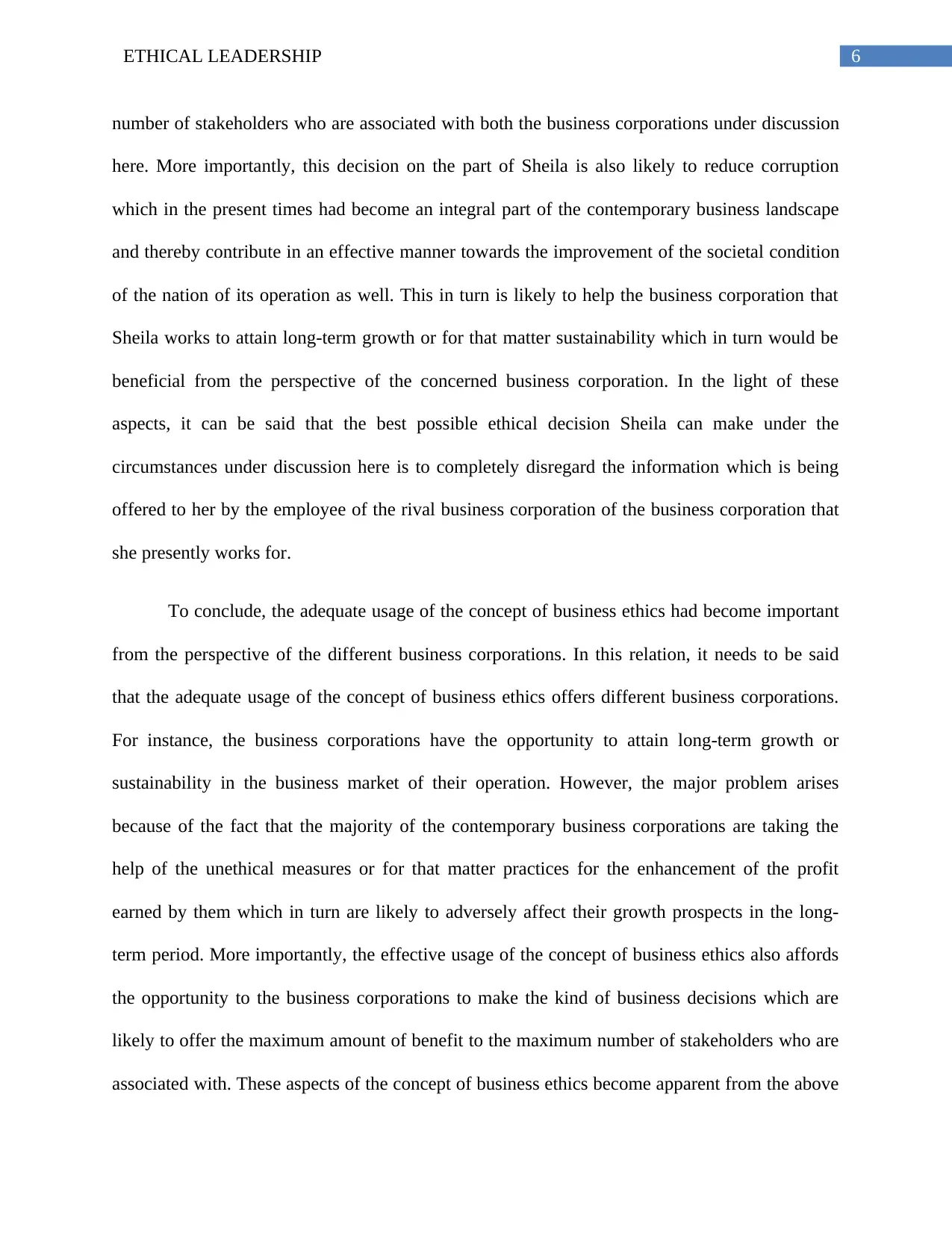
6ETHICAL LEADERSHIP
number of stakeholders who are associated with both the business corporations under discussion
here. More importantly, this decision on the part of Sheila is also likely to reduce corruption
which in the present times had become an integral part of the contemporary business landscape
and thereby contribute in an effective manner towards the improvement of the societal condition
of the nation of its operation as well. This in turn is likely to help the business corporation that
Sheila works to attain long-term growth or for that matter sustainability which in turn would be
beneficial from the perspective of the concerned business corporation. In the light of these
aspects, it can be said that the best possible ethical decision Sheila can make under the
circumstances under discussion here is to completely disregard the information which is being
offered to her by the employee of the rival business corporation of the business corporation that
she presently works for.
To conclude, the adequate usage of the concept of business ethics had become important
from the perspective of the different business corporations. In this relation, it needs to be said
that the adequate usage of the concept of business ethics offers different business corporations.
For instance, the business corporations have the opportunity to attain long-term growth or
sustainability in the business market of their operation. However, the major problem arises
because of the fact that the majority of the contemporary business corporations are taking the
help of the unethical measures or for that matter practices for the enhancement of the profit
earned by them which in turn are likely to adversely affect their growth prospects in the long-
term period. More importantly, the effective usage of the concept of business ethics also affords
the opportunity to the business corporations to make the kind of business decisions which are
likely to offer the maximum amount of benefit to the maximum number of stakeholders who are
associated with. These aspects of the concept of business ethics become apparent from the above
number of stakeholders who are associated with both the business corporations under discussion
here. More importantly, this decision on the part of Sheila is also likely to reduce corruption
which in the present times had become an integral part of the contemporary business landscape
and thereby contribute in an effective manner towards the improvement of the societal condition
of the nation of its operation as well. This in turn is likely to help the business corporation that
Sheila works to attain long-term growth or for that matter sustainability which in turn would be
beneficial from the perspective of the concerned business corporation. In the light of these
aspects, it can be said that the best possible ethical decision Sheila can make under the
circumstances under discussion here is to completely disregard the information which is being
offered to her by the employee of the rival business corporation of the business corporation that
she presently works for.
To conclude, the adequate usage of the concept of business ethics had become important
from the perspective of the different business corporations. In this relation, it needs to be said
that the adequate usage of the concept of business ethics offers different business corporations.
For instance, the business corporations have the opportunity to attain long-term growth or
sustainability in the business market of their operation. However, the major problem arises
because of the fact that the majority of the contemporary business corporations are taking the
help of the unethical measures or for that matter practices for the enhancement of the profit
earned by them which in turn are likely to adversely affect their growth prospects in the long-
term period. More importantly, the effective usage of the concept of business ethics also affords
the opportunity to the business corporations to make the kind of business decisions which are
likely to offer the maximum amount of benefit to the maximum number of stakeholders who are
associated with. These aspects of the concept of business ethics become apparent from the above
Paraphrase This Document
Need a fresh take? Get an instant paraphrase of this document with our AI Paraphraser
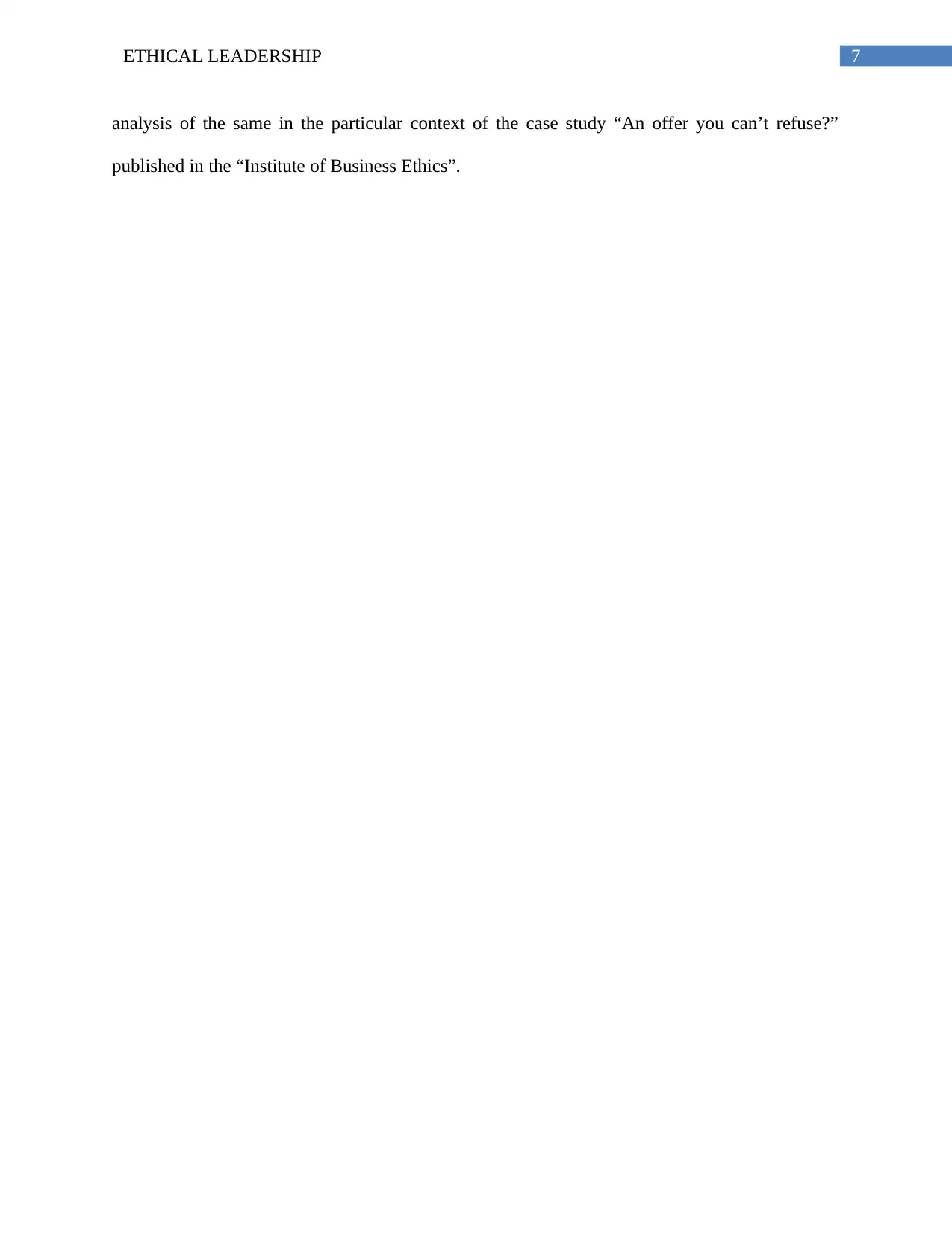
7ETHICAL LEADERSHIP
analysis of the same in the particular context of the case study “An offer you can’t refuse?”
published in the “Institute of Business Ethics”.
analysis of the same in the particular context of the case study “An offer you can’t refuse?”
published in the “Institute of Business Ethics”.
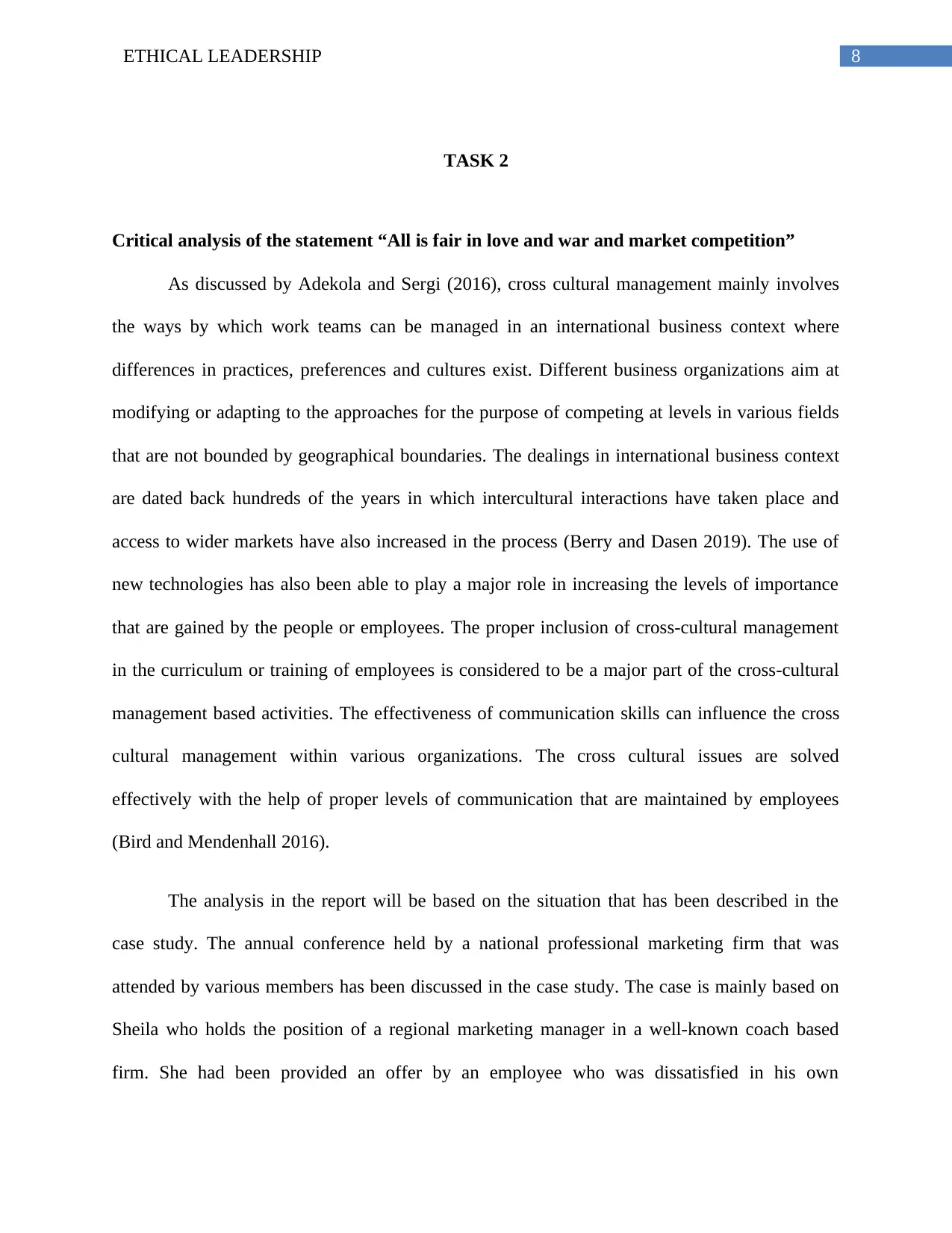
8ETHICAL LEADERSHIP
TASK 2
Critical analysis of the statement “All is fair in love and war and market competition”
As discussed by Adekola and Sergi (2016), cross cultural management mainly involves
the ways by which work teams can be managed in an international business context where
differences in practices, preferences and cultures exist. Different business organizations aim at
modifying or adapting to the approaches for the purpose of competing at levels in various fields
that are not bounded by geographical boundaries. The dealings in international business context
are dated back hundreds of the years in which intercultural interactions have taken place and
access to wider markets have also increased in the process (Berry and Dasen 2019). The use of
new technologies has also been able to play a major role in increasing the levels of importance
that are gained by the people or employees. The proper inclusion of cross-cultural management
in the curriculum or training of employees is considered to be a major part of the cross-cultural
management based activities. The effectiveness of communication skills can influence the cross
cultural management within various organizations. The cross cultural issues are solved
effectively with the help of proper levels of communication that are maintained by employees
(Bird and Mendenhall 2016).
The analysis in the report will be based on the situation that has been described in the
case study. The annual conference held by a national professional marketing firm that was
attended by various members has been discussed in the case study. The case is mainly based on
Sheila who holds the position of a regional marketing manager in a well-known coach based
firm. She had been provided an offer by an employee who was dissatisfied in his own
TASK 2
Critical analysis of the statement “All is fair in love and war and market competition”
As discussed by Adekola and Sergi (2016), cross cultural management mainly involves
the ways by which work teams can be managed in an international business context where
differences in practices, preferences and cultures exist. Different business organizations aim at
modifying or adapting to the approaches for the purpose of competing at levels in various fields
that are not bounded by geographical boundaries. The dealings in international business context
are dated back hundreds of the years in which intercultural interactions have taken place and
access to wider markets have also increased in the process (Berry and Dasen 2019). The use of
new technologies has also been able to play a major role in increasing the levels of importance
that are gained by the people or employees. The proper inclusion of cross-cultural management
in the curriculum or training of employees is considered to be a major part of the cross-cultural
management based activities. The effectiveness of communication skills can influence the cross
cultural management within various organizations. The cross cultural issues are solved
effectively with the help of proper levels of communication that are maintained by employees
(Bird and Mendenhall 2016).
The analysis in the report will be based on the situation that has been described in the
case study. The annual conference held by a national professional marketing firm that was
attended by various members has been discussed in the case study. The case is mainly based on
Sheila who holds the position of a regional marketing manager in a well-known coach based
firm. She had been provided an offer by an employee who was dissatisfied in his own
⊘ This is a preview!⊘
Do you want full access?
Subscribe today to unlock all pages.

Trusted by 1+ million students worldwide
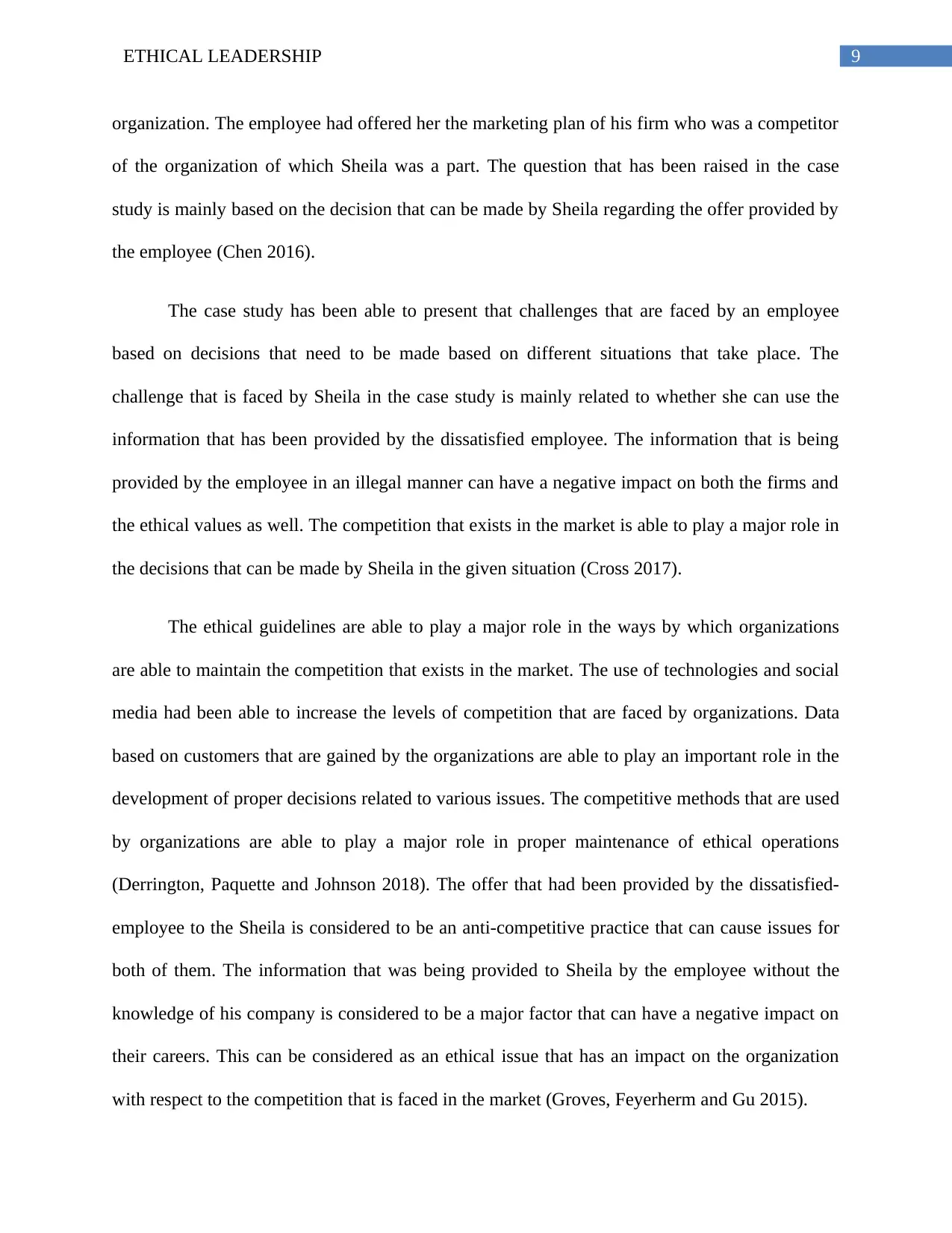
9ETHICAL LEADERSHIP
organization. The employee had offered her the marketing plan of his firm who was a competitor
of the organization of which Sheila was a part. The question that has been raised in the case
study is mainly based on the decision that can be made by Sheila regarding the offer provided by
the employee (Chen 2016).
The case study has been able to present that challenges that are faced by an employee
based on decisions that need to be made based on different situations that take place. The
challenge that is faced by Sheila in the case study is mainly related to whether she can use the
information that has been provided by the dissatisfied employee. The information that is being
provided by the employee in an illegal manner can have a negative impact on both the firms and
the ethical values as well. The competition that exists in the market is able to play a major role in
the decisions that can be made by Sheila in the given situation (Cross 2017).
The ethical guidelines are able to play a major role in the ways by which organizations
are able to maintain the competition that exists in the market. The use of technologies and social
media had been able to increase the levels of competition that are faced by organizations. Data
based on customers that are gained by the organizations are able to play an important role in the
development of proper decisions related to various issues. The competitive methods that are used
by organizations are able to play a major role in proper maintenance of ethical operations
(Derrington, Paquette and Johnson 2018). The offer that had been provided by the dissatisfied-
employee to the Sheila is considered to be an anti-competitive practice that can cause issues for
both of them. The information that was being provided to Sheila by the employee without the
knowledge of his company is considered to be a major factor that can have a negative impact on
their careers. This can be considered as an ethical issue that has an impact on the organization
with respect to the competition that is faced in the market (Groves, Feyerherm and Gu 2015).
organization. The employee had offered her the marketing plan of his firm who was a competitor
of the organization of which Sheila was a part. The question that has been raised in the case
study is mainly based on the decision that can be made by Sheila regarding the offer provided by
the employee (Chen 2016).
The case study has been able to present that challenges that are faced by an employee
based on decisions that need to be made based on different situations that take place. The
challenge that is faced by Sheila in the case study is mainly related to whether she can use the
information that has been provided by the dissatisfied employee. The information that is being
provided by the employee in an illegal manner can have a negative impact on both the firms and
the ethical values as well. The competition that exists in the market is able to play a major role in
the decisions that can be made by Sheila in the given situation (Cross 2017).
The ethical guidelines are able to play a major role in the ways by which organizations
are able to maintain the competition that exists in the market. The use of technologies and social
media had been able to increase the levels of competition that are faced by organizations. Data
based on customers that are gained by the organizations are able to play an important role in the
development of proper decisions related to various issues. The competitive methods that are used
by organizations are able to play a major role in proper maintenance of ethical operations
(Derrington, Paquette and Johnson 2018). The offer that had been provided by the dissatisfied-
employee to the Sheila is considered to be an anti-competitive practice that can cause issues for
both of them. The information that was being provided to Sheila by the employee without the
knowledge of his company is considered to be a major factor that can have a negative impact on
their careers. This can be considered as an ethical issue that has an impact on the organization
with respect to the competition that is faced in the market (Groves, Feyerherm and Gu 2015).
Paraphrase This Document
Need a fresh take? Get an instant paraphrase of this document with our AI Paraphraser
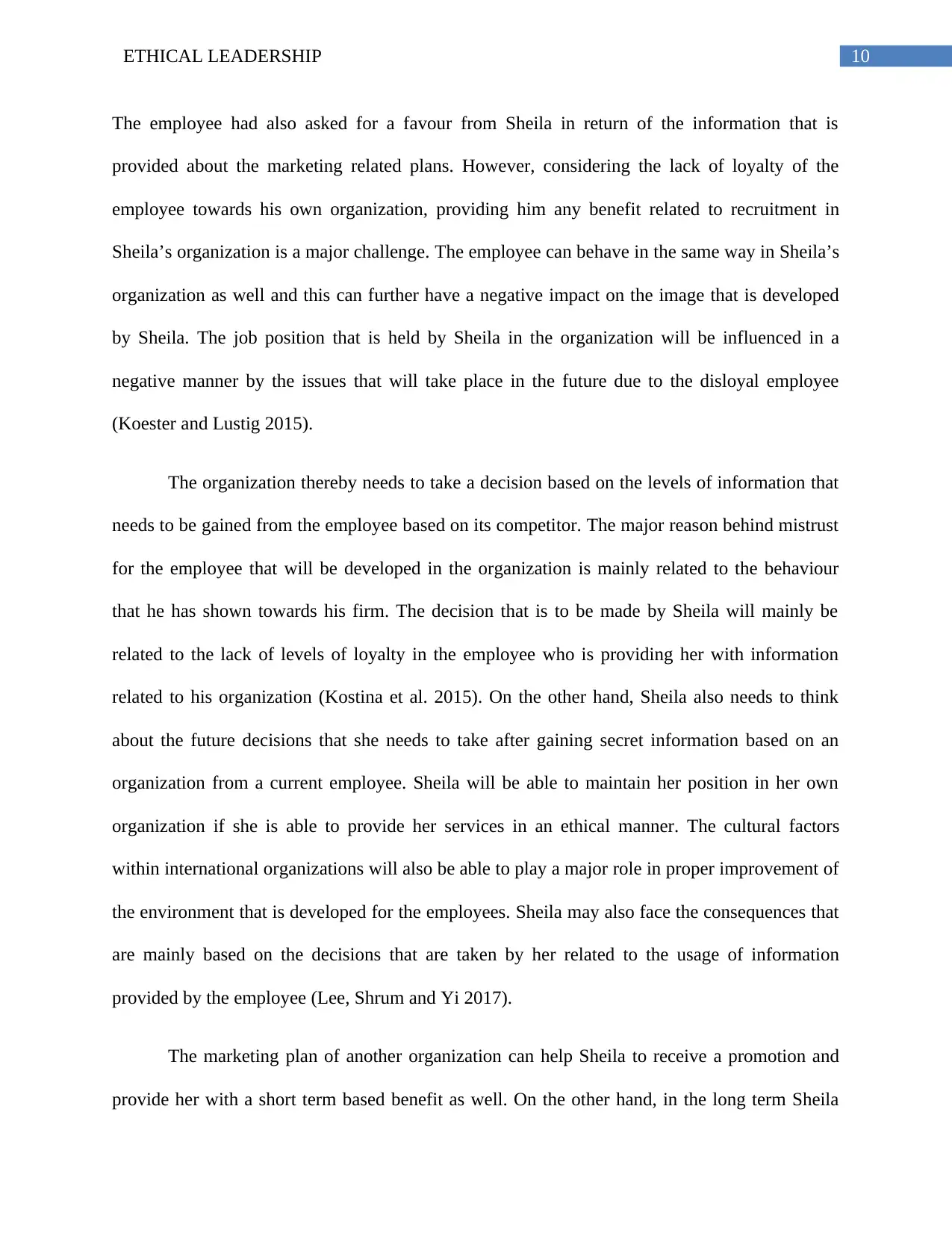
10ETHICAL LEADERSHIP
The employee had also asked for a favour from Sheila in return of the information that is
provided about the marketing related plans. However, considering the lack of loyalty of the
employee towards his own organization, providing him any benefit related to recruitment in
Sheila’s organization is a major challenge. The employee can behave in the same way in Sheila’s
organization as well and this can further have a negative impact on the image that is developed
by Sheila. The job position that is held by Sheila in the organization will be influenced in a
negative manner by the issues that will take place in the future due to the disloyal employee
(Koester and Lustig 2015).
The organization thereby needs to take a decision based on the levels of information that
needs to be gained from the employee based on its competitor. The major reason behind mistrust
for the employee that will be developed in the organization is mainly related to the behaviour
that he has shown towards his firm. The decision that is to be made by Sheila will mainly be
related to the lack of levels of loyalty in the employee who is providing her with information
related to his organization (Kostina et al. 2015). On the other hand, Sheila also needs to think
about the future decisions that she needs to take after gaining secret information based on an
organization from a current employee. Sheila will be able to maintain her position in her own
organization if she is able to provide her services in an ethical manner. The cultural factors
within international organizations will also be able to play a major role in proper improvement of
the environment that is developed for the employees. Sheila may also face the consequences that
are mainly based on the decisions that are taken by her related to the usage of information
provided by the employee (Lee, Shrum and Yi 2017).
The marketing plan of another organization can help Sheila to receive a promotion and
provide her with a short term based benefit as well. On the other hand, in the long term Sheila
The employee had also asked for a favour from Sheila in return of the information that is
provided about the marketing related plans. However, considering the lack of loyalty of the
employee towards his own organization, providing him any benefit related to recruitment in
Sheila’s organization is a major challenge. The employee can behave in the same way in Sheila’s
organization as well and this can further have a negative impact on the image that is developed
by Sheila. The job position that is held by Sheila in the organization will be influenced in a
negative manner by the issues that will take place in the future due to the disloyal employee
(Koester and Lustig 2015).
The organization thereby needs to take a decision based on the levels of information that
needs to be gained from the employee based on its competitor. The major reason behind mistrust
for the employee that will be developed in the organization is mainly related to the behaviour
that he has shown towards his firm. The decision that is to be made by Sheila will mainly be
related to the lack of levels of loyalty in the employee who is providing her with information
related to his organization (Kostina et al. 2015). On the other hand, Sheila also needs to think
about the future decisions that she needs to take after gaining secret information based on an
organization from a current employee. Sheila will be able to maintain her position in her own
organization if she is able to provide her services in an ethical manner. The cultural factors
within international organizations will also be able to play a major role in proper improvement of
the environment that is developed for the employees. Sheila may also face the consequences that
are mainly based on the decisions that are taken by her related to the usage of information
provided by the employee (Lee, Shrum and Yi 2017).
The marketing plan of another organization can help Sheila to receive a promotion and
provide her with a short term based benefit as well. On the other hand, in the long term Sheila
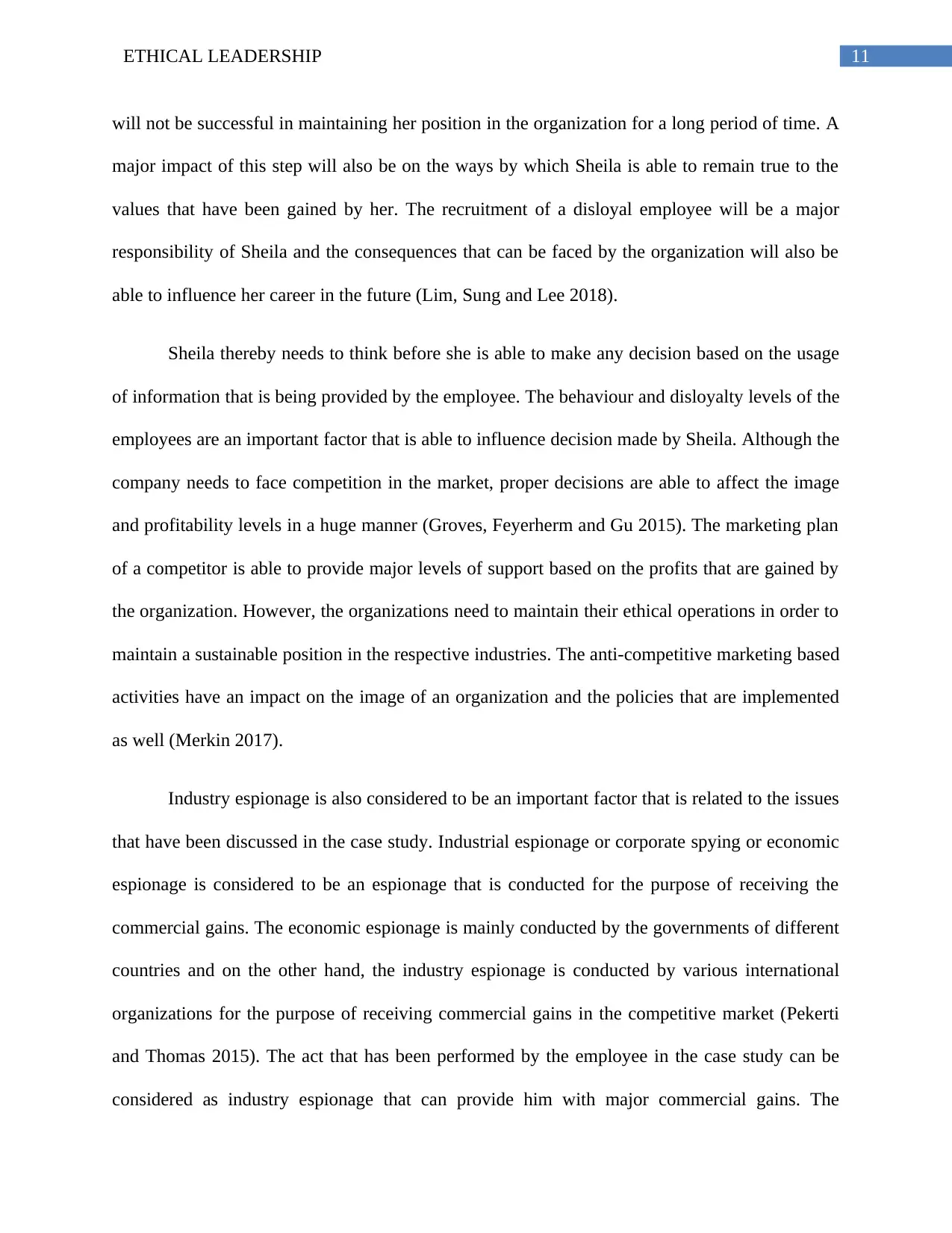
11ETHICAL LEADERSHIP
will not be successful in maintaining her position in the organization for a long period of time. A
major impact of this step will also be on the ways by which Sheila is able to remain true to the
values that have been gained by her. The recruitment of a disloyal employee will be a major
responsibility of Sheila and the consequences that can be faced by the organization will also be
able to influence her career in the future (Lim, Sung and Lee 2018).
Sheila thereby needs to think before she is able to make any decision based on the usage
of information that is being provided by the employee. The behaviour and disloyalty levels of the
employees are an important factor that is able to influence decision made by Sheila. Although the
company needs to face competition in the market, proper decisions are able to affect the image
and profitability levels in a huge manner (Groves, Feyerherm and Gu 2015). The marketing plan
of a competitor is able to provide major levels of support based on the profits that are gained by
the organization. However, the organizations need to maintain their ethical operations in order to
maintain a sustainable position in the respective industries. The anti-competitive marketing based
activities have an impact on the image of an organization and the policies that are implemented
as well (Merkin 2017).
Industry espionage is also considered to be an important factor that is related to the issues
that have been discussed in the case study. Industrial espionage or corporate spying or economic
espionage is considered to be an espionage that is conducted for the purpose of receiving the
commercial gains. The economic espionage is mainly conducted by the governments of different
countries and on the other hand, the industry espionage is conducted by various international
organizations for the purpose of receiving commercial gains in the competitive market (Pekerti
and Thomas 2015). The act that has been performed by the employee in the case study can be
considered as industry espionage that can provide him with major commercial gains. The
will not be successful in maintaining her position in the organization for a long period of time. A
major impact of this step will also be on the ways by which Sheila is able to remain true to the
values that have been gained by her. The recruitment of a disloyal employee will be a major
responsibility of Sheila and the consequences that can be faced by the organization will also be
able to influence her career in the future (Lim, Sung and Lee 2018).
Sheila thereby needs to think before she is able to make any decision based on the usage
of information that is being provided by the employee. The behaviour and disloyalty levels of the
employees are an important factor that is able to influence decision made by Sheila. Although the
company needs to face competition in the market, proper decisions are able to affect the image
and profitability levels in a huge manner (Groves, Feyerherm and Gu 2015). The marketing plan
of a competitor is able to provide major levels of support based on the profits that are gained by
the organization. However, the organizations need to maintain their ethical operations in order to
maintain a sustainable position in the respective industries. The anti-competitive marketing based
activities have an impact on the image of an organization and the policies that are implemented
as well (Merkin 2017).
Industry espionage is also considered to be an important factor that is related to the issues
that have been discussed in the case study. Industrial espionage or corporate spying or economic
espionage is considered to be an espionage that is conducted for the purpose of receiving the
commercial gains. The economic espionage is mainly conducted by the governments of different
countries and on the other hand, the industry espionage is conducted by various international
organizations for the purpose of receiving commercial gains in the competitive market (Pekerti
and Thomas 2015). The act that has been performed by the employee in the case study can be
considered as industry espionage that can provide him with major commercial gains. The
⊘ This is a preview!⊘
Do you want full access?
Subscribe today to unlock all pages.

Trusted by 1+ million students worldwide
1 out of 18
Related Documents
Your All-in-One AI-Powered Toolkit for Academic Success.
+13062052269
info@desklib.com
Available 24*7 on WhatsApp / Email
![[object Object]](/_next/static/media/star-bottom.7253800d.svg)
Unlock your academic potential
Copyright © 2020–2026 A2Z Services. All Rights Reserved. Developed and managed by ZUCOL.





